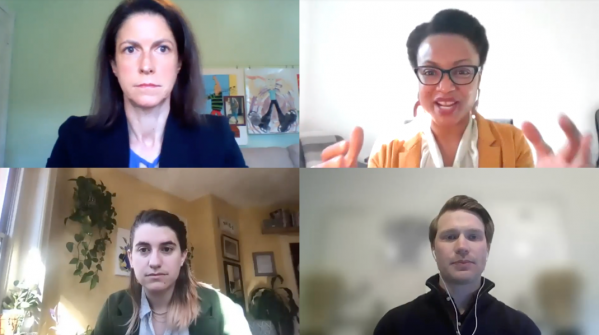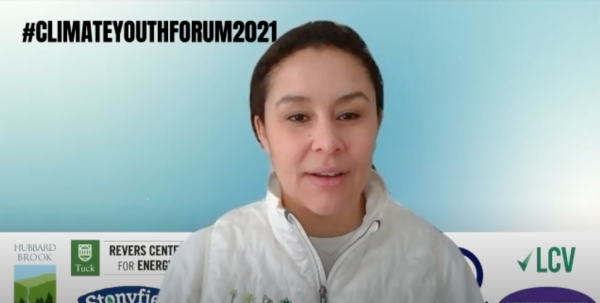
While this past year will likely be most remembered for the COVID-19 pandemic, climate change remains a critical issue and the majority of federal and state politicians recognize the need to act now to protect the planet for future generations.
On March 8, in a virtual forum co-hosted by Tuck, Stonyfield Organic, the Hubbard Brook Research Foundation, Revision Energy, League of Conservation Voters, and Sustainable Future Consulting, students asked recently appointed members of the Biden administration and New Hampshire’s Congressional delegation about their plans to combat climate change.
Much of the forum’s discussion reflected the interwoven nature of climate change and environmental justice, as leaders advocated for holistic solutions. The panelists stressed the importance of a whole-of-government approach to climate change, economic growth, inclusion, and equity. Students heard from leaders in business as well, who stressed the importance of integrated solutions, explaining how corporations have the ability to make a difference by leveraging their brand, partnerships, and operations.
The forum started with a panel focused on the Biden Administration’s clean energy/climate priorities. Tiernan Sittenfeld, senior vp at the League of Conservation Voters, moderated the conversation as students asked Shalanda Baker, the recently appointed deputy director for energy justice and Hannah Bristol, associate director at the White House Office of Engagement, questions related to the Biden administration’s climate plans.

Alex Krass T’22 asked Baker about what role she believes the federal government can play in spurring private investment in equitable and green solutions. Revers Center Fellow Anna Douglas T’21 questioned both Baker and Bristol about how an on-the-job training or leadership development program could help to address the increasing need for infrastructural expertise within communities due to climate change.
Next, students questioned New Hampshire’s Congressional delegation, including U.S. Senator Maggie Hassan, Senator Jeanne Shaheen, Representative Chris Pappas, and Representative Annie Kuster about what Congress is doing to prioritize climate and environmental justice solutions. Senator Hassan emphasized the importance of the day’s discussion, “Climate change is an existential threat, and we want all of you to be empowered to speak with real authority and to push for real action. You’re doing the vital work to raise awareness.”
The third plenary session was focused on transportation and offshore wind. During this session, Revers Center fellow Elisabeth Sum T’21 and Hannah Saltman T’22 asked speakers Elizabeth Turnball Henry, president of the Environmental League of Massachusetts, Alli Gold Roberts, director of state policy at Ceres, Inc., and Florence Chen, special assistant for policy at the DOT, pressing questions related to the future of transportation and offshore wind in the United States and what role they will play in the broader energy transition.
Following the three main plenary sessions, forum participants were able to join three different breakout sessions focused on topics ranging from careers in clean energy to nature-based carbon solutions to climate, clean energy and equity actions within New Hampshire specifically.

To conclude the event, April Salas, executive director of the Revers Center for Energy at Tuck, delivered closing remarks. Salas highlighted the key themes from the event, including the importance of accountability, particularly during this “moment of unprecedented opportunity.”
“I think we heard over and over, a whole of government approach to climate, decarbonization, and inclusion and equity is integral," said Salas. Beyond government, Salas reiterated the power of aligning partnerships, capital, policy and technology to drive equitable transition to a clean energy economy.
The forum was an incredibly exciting and powerful opportunity for Tuck students to directly engage key federal and state politicians and business and science leaders on the issue of climate change and our country’s transition to a low carbon economy.
The Revers Center for Energy is building a thriving energy community at Tuck, Dartmouth, and beyond as we work to inspire and shape tomorrow's leaders in energy while engaging today's energy community. We believe that regardless of industry, tomorrow's wise leaders will need to make informed energy, climate change, and sustainability decisions during their careers that drive innovation for a sustainable future.